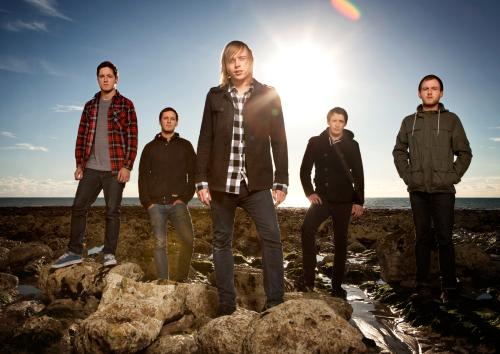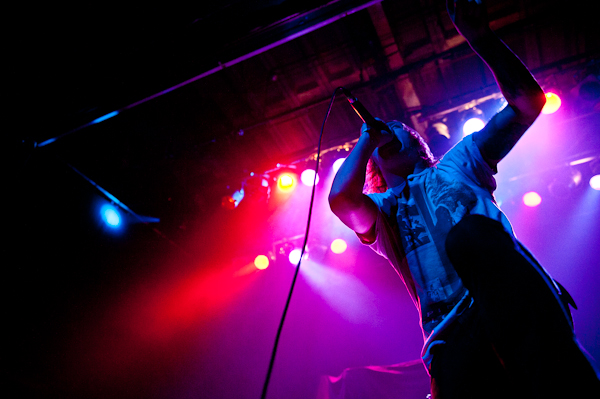
If you don’t play with heart, then there’s no sense in being a musician. Brighton’s ARCHITECTS have shown devotion to that aphorism as its fabricated their career, pushing them beyond the United Kingdom and molding them into a respected metalcore act. During their tour run in Germany, vocalist Sam Carter reflected on the band’s recent shift and pitched why listeners should be more impartial.
The Here And Now features a major change in the band’s style; have there been any changes in your lives that mirror or influenced this variation?
That’s probably the best question I’ve been asked in a long time. Better than “you’ve changed, talk about it”. I think we’ve become a lot more positive and appreciative as people. For a while we would complain and moan, wonder why we weren’t the same size as other bands and pick holes in everything really. It just got to a point one day where we we had to realize we’re extremely lucky to be doing what we’re doing and we’re pretty much living our dream.
Becoming a lot more positive and appreciative of everything has obviously had a big impact on our music because there’s no point in writing negative lyrics and being negative if you’re not negative dudes. We’re extremely positive and the record really reflects that.
Did producer Steve Evetts have anything to do with this change in sound?
Steve gave us a bit more confidence. He was the first person to hear everything and he gave us a bit more to do and pushed us to attempt certain things. He gave us a lot more confidence as musicians but I think the change had already happened before we got to the studio.
What about the guest vocalists?
Andrew Neufeld (Comeback Kid) has been a friend of ours for a long time. We’ve done a bunch of tours with him. He asked me to sing on his band’s record and I told him I’m 100 per cent cool to sing on theirs if he sang on ours. That’s how that came about. It was kind of like securing a friendship between two bands. Greg Puciato (The Dillinger Escape Plan) was no different as we hadn’t actually planned to have him on the album.
We were recording in Los Angeles when Greg came down to the studio a few times and started hanging out. He really liked the album and asked if he could sing on it and we were all like, “f*ck yeah, you can sing on the record!”. The Dillinger Escape Plan are such a massive influence on Architects. Back in the day, that’s what we wanted to sound like when we were younger.
“Hollow Crown was a very important record as it was a time and a place for certain kids. But at the end of the day, people need to realize we don’t belong to them.”
Did the collaborations present any obstacles?
The collaborations were actually cool because with Greg he was actually there so we spent time on making his part right. Instead of just being a guest vocalist that does two lines and then you don’t hear him again for the whole song, we worked really hard to make a good piece for him to sing. In the studio, there are always problems in the sense of recording. Everyone wants to do better, everyone wants that goal and some people disagree with each other. It’s always such a stressful time and though it can be hard to get your shit together, we figured it out.
One highlight you figured out is your clean vocals. Why did you choose to focus on them more?
I’ve started to really enjoy singing. We’ve always had singing, but over the last year my voice has grown a bit and I know my limits a bit more so I’ve become better at it. When we were in Los Angeles, I took singing lessons and learned a lot of things about my voice. We don’t really listen to that much heavy music and we kind of wanted lots of singing on the album. There probably would have been more singing if we had really let ourselves go, just because we love it. It’s cool when you listen to a song and you have a chorus stuck in your head all day. No one wants to listen to someone shouting for five minutes straight. Everyone wants something to sing along to.

Going back to the singing lessons you mentioned; did you think you needed to work on your vocals a bit?
I’ve always been singing because I taught myself how but I wasn’t that great before this album. The guy that helped me was amazing as he taught me more about techniques, warm-ups and singing to scales. That helps my range, something I never really focused on. Breathing techniques have become a huge thing for me now because I’m doing more clean vocals. They taught me how to sing properly while still giving 100 per cent.
With regards to your latest album, what are your thoughts on the criticism you’ve received from fans?
It kind of gets to me a bit more than everyone else. It does wind me up. I was brought up with the saying, “if you’ve got nothing nice to say, don’t say anything at all”. I think a lot of people just open their mouths and say stuff blindly or to agree with others. Hollow Crown was a very important record for people as it was a time and a place for certain kids. But at the end of the day, people need to realize that we don’t belong to them. We are the guys that are writing material and we’re the ones that have to play it while touring. It’s better to be true to yourself and write something you truly love and want to play for the next few years than to do something just to gain success.
While recording, we were a bit worried about the idea we might be alienating our fans but experimenting and never limiting ourselves to boundaries is exciting. I don’t think enough bands do what they want. So many of them are interested in being big and impressing people and it seems like they’ve kind of lost the spark. If we did Hollow Crown Part II, we would have let ourselves down because we think it’s important to progress as musicians.

Change is inevitable. Which do you anticipate to be a greater result from this release: the gain of new fans or the loss of old ones?
We’re going to gain some new fans from it. At the same time, if we lose certain fans, then that’s fine. People aren’t always going to like what we like. In an ideal world, people will progress with us even though you can’t always want that. You have to let kids do what they do. When I was younger and Thrice released Vheissu, I was really confused. I thought they changed. Literally half a year later it became, and still is, one of my favourite records. Depending on how they feel, it’s just a matter of time for kids to figure it out for themselves with the new album.
You’ve done the unthinkable, blending sensitivity with emotion while remaining true to your sound. Is this the new standard for you guys?
I don’t think we’ll ever go back. I think we’ll just keep looking forward. Right now, I have no idea what the next record is going to sound like but I’m sure it will still be good. We just want to keep experimenting and trying to make things interesting for ourselves and for the kids out there.
[Like this interview? Follow our new Twitter account for news updates and more]
Great read. Still trying to get into this album though.
agreed, but good interview.
The guys over here continue to do great interviews with bands. Instead of lashing out and focusing every question on criticism the band’s getting, the girl casually talks about it and Sam voices his opinion. Solid job guys, this might be the best music interview I’ve read all year.
i love Sam. is the new album out on itunes yet?
Awesome interview Leah. Keep up the good work!